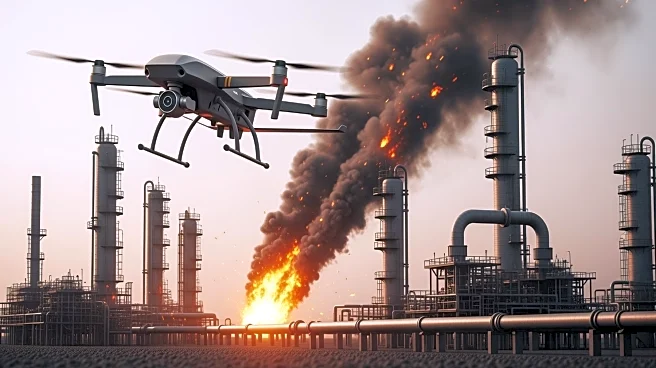What's Happening?
Ukraine's strategic drone attacks on Russian oil infrastructure have significantly impacted Moscow's fossil fuel exports. In September, these exports fell to their lowest level since the beginning of Russia's invasion of Ukraine nearly four years ago.
The Centre for Research on Energy and Clean Air reported that Russia exported an average of $637 million worth of fuel daily last month, marking a 4% decrease from August and a 26% drop compared to September 2024. Ukrainian President Volodymyr Zelensky has intensified drone strikes on Russian oil refineries, depots, and terminals, describing these actions as effective sanctions. Recent targets include the oil terminal in Crimea and the Kirishi refinery in the Leningrad region, both of which suffered significant damage.
Why It's Important?
The decline in Russian fossil fuel exports is a critical development in the ongoing geopolitical tensions surrounding the Ukraine conflict. These attacks disrupt Russia's ability to fund its military operations, potentially weakening its position in the war. The economic impact extends beyond Russia, affecting global energy markets and trade dynamics. Countries like China and India, major buyers of Russian fossil fuels, may face supply challenges and price fluctuations. Additionally, President Trump's imposition of a 50% tariff on Indian exports highlights the broader international ramifications, as nations reassess their energy trade policies in response to the conflict.
What's Next?
The European Union is moving forward with a draft proposal to gradually ban pipeline and LNG imports from Russia starting January 1, 2026. This decision could further strain Russia's economy and alter global energy supply chains. NATO members, urged by President Trump, may reconsider their purchases of Russian oil, potentially leading to a shift in alliances and trade partnerships. The ongoing drone attacks by Ukraine suggest continued pressure on Russian oil infrastructure, which could lead to further declines in exports and increased geopolitical tensions.
Beyond the Headlines
The strategic use of drones by Ukraine raises ethical and legal questions about warfare tactics and the targeting of civilian infrastructure. These actions may set precedents for future conflicts, where non-traditional warfare methods become more prevalent. The long-term implications for global energy security and the transition to alternative energy sources could be significant, as countries seek to reduce dependency on fossil fuels from politically unstable regions.















